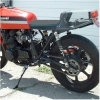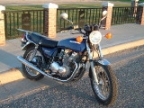Can I dump resister caps?
- KaZooCruiser
-
Topic Author
- Offline
- User
-

Registered
- Posts: 456
- Thanks: 7
Can I dump resister caps?
30 May 2007 07:39
What is the point to any resistance on the secondary side of the ignition circuit?
Can I do away with resister caps entirely?
I was thinking of getting mini boots, like the ones for a lawnmower, with a spring (for the plug) and a point (for the wire). Four of them at NAPA are less than $5.00.
Thanks
:lol:
Can I do away with resister caps entirely?
I was thinking of getting mini boots, like the ones for a lawnmower, with a spring (for the plug) and a point (for the wire). Four of them at NAPA are less than $5.00.
Thanks
:lol:
Please Log in or Create an account to join the conversation.
- loudhvx
-

- Offline
- KZr Legend
-

Registered
- Posts: 10863
- Thanks: 1622
Re: Can I dump resister caps?
30 May 2007 10:24
The resistance reduces radio interference. I think it may help protect the coils in certain circumstances, but mostly it's the interference issue.
If you use resistor wire, you don't need resistor caps and vice versa.
If you use resistor wire, you don't need resistor caps and vice versa.
1981 KZ550 D1 gpz.
Kz550 valve train warning.
Other links.
Kz550 valve train warning.
Other links.
Please Log in or Create an account to join the conversation.
- Duck
-

- Offline
- User
-

Registered
- e vica na i sau na ga
- Posts: 1267
- Thanks: 35
Re: Can I dump resister caps?
30 May 2007 11:10
loudhvx wrote:
Lou-
Does resistance increase the duration of the spark?
t=L/R
The resistance reduces radio interference. I think it may help protect the coils in certain circumstances, but mostly it's the interference issue.
If you use resistor wire, you don't need resistor caps and vice versa.
Lou-
Does resistance increase the duration of the spark?
t=L/R
Please Log in or Create an account to join the conversation.
- pyxen
-
- Offline
- User
-

Registered
- Posts: 488
- Thanks: 7
Re: Can I dump resister caps?
30 May 2007 11:11
What about resistor plugs?
I was told that I had to have 5k ohms of resistance in the system/wires to protect the ignition - is this the reason?
I was told that I had to have 5k ohms of resistance in the system/wires to protect the ignition - is this the reason?
84 KZ550-F2 LTD
93 ZR550-B4
93 ZR550-B4
Please Log in or Create an account to join the conversation.
- Patton
-

- Offline
- KZr Legend
-

Registered
- Posts: 18567
- Thanks: 2103
Re: Can I dump resister caps?
30 May 2007 11:18
Could be wrong, but believe my Dyna solid core plug wires with caps already built in have no resistance in either wires or caps.
Some spark plugs have a resistor built in to further help reduce radio interference. Such as NGKBR8ES as opposed to the standard NGKB8ES. I don't use the resistor plugs either.
Just breaks my heart to interfere with some cage driver's rousing BOOM BOOM BOOM box reception.
Some spark plugs have a resistor built in to further help reduce radio interference. Such as NGKBR8ES as opposed to the standard NGKB8ES. I don't use the resistor plugs either.
Just breaks my heart to interfere with some cage driver's rousing BOOM BOOM BOOM box reception.
1973 Z1
KZ900 LTD
KZ900 LTD
Please Log in or Create an account to join the conversation.
- loudhvx
-

- Offline
- KZr Legend
-

Registered
- Posts: 10863
- Thanks: 1622
Re: Can I dump resister caps?
30 May 2007 11:53
Duck wrote:
Since the time constant, Tau varies like Tau=L/R (as you mentioned), the time constant varies inversely with R. Therefore higher resistance will reduce the spark duration. It also reduces the spark current and thus the energy. (It doesn't reduce the spark voltage because the spark voltage is determined by the arc after it's initiated).
So resistors reduce the spark energy for sure, but the amount is very small. A good engine with good mixture won't notice the difference. (By good I mean stock in good condition. Race enginesare a different story.)
I forgot to mention resistor plugs have the same affect. You only want one out of the three (wire, cap, or plug) to be resistorized. If you double up, then the energy reduction starts to get significant enough to make a difference.
Now this is just a hypothesis: I think that having the resistance may protect the coil in case a lead shorts out. It will limit the current through the coil's secondary. After prolonged shorted usage the winding may overheat. This may be a non-issue though, so if you want to run straight copper, just to wipe out car computer's :evil: the coil will probably be fine.
loudhvx wrote:The resistance reduces radio interference. I think it may help protect the coils in certain circumstances, but mostly it's the interference issue.
If you use resistor wire, you don't need resistor caps and vice versa.
Lou-
Does resistance increase the duration of the spark?
t=L/R
Since the time constant, Tau varies like Tau=L/R (as you mentioned), the time constant varies inversely with R. Therefore higher resistance will reduce the spark duration. It also reduces the spark current and thus the energy. (It doesn't reduce the spark voltage because the spark voltage is determined by the arc after it's initiated).
So resistors reduce the spark energy for sure, but the amount is very small. A good engine with good mixture won't notice the difference. (By good I mean stock in good condition. Race enginesare a different story.)
I forgot to mention resistor plugs have the same affect. You only want one out of the three (wire, cap, or plug) to be resistorized. If you double up, then the energy reduction starts to get significant enough to make a difference.
Now this is just a hypothesis: I think that having the resistance may protect the coil in case a lead shorts out. It will limit the current through the coil's secondary. After prolonged shorted usage the winding may overheat. This may be a non-issue though, so if you want to run straight copper, just to wipe out car computer's :evil: the coil will probably be fine.
1981 KZ550 D1 gpz.
Kz550 valve train warning.
Other links.
Kz550 valve train warning.
Other links.
Please Log in or Create an account to join the conversation.
- ronjones
-

- Offline
- User
-

Registered
- Posts: 565
- Thanks: 4
Re: Can I dump resister caps?
30 May 2007 13:17
loudhvx wrote:
Cool, now I know why, there was no effect when I went to solid copper.
I went to a dyna coil and also to straight copper because it was an easier switch, and also one of my resistor caps is intermittently bad.
Now that I know what's going on, if I get a helmet radio setup, I'll know why the d&mn thing ain't workin' .
.
Duck wrote:loudhvx wrote:The resistance reduces radio interference. I think it may help protect the coils in certain circumstances, but mostly it's the interference issue.
If you use resistor wire, you don't need resistor caps and vice versa.
Lou-
Does resistance increase the duration of the spark?
t=L/R
Since the time constant, Tau varies like Tau=L/R (as you mentioned), the time constant varies inversely with R. Therefore higher resistance will reduce the spark duration. It also reduces the spark current and thus the energy. (It doesn't reduce the spark voltage because the spark voltage is determined by the arc after it's initiated).
So resistors reduce the spark energy for sure, but the amount is very small. A good engine with good mixture won't notice the difference. (By good I mean stock in good condition. Race enginesare a different story.)
I forgot to mention resistor plugs have the same affect. You only want one out of the three (wire, cap, or plug) to be resistorized. If you double up, then the energy reduction starts to get significant enough to make a difference.
Now this is just a hypothesis: I think that having the resistance may protect the coil in case a lead shorts out. It will limit the current through the coil's secondary. After prolonged shorted usage the winding may overheat. This may be a non-issue though, so if you want to run straight copper, just to wipe out car computer's :evil: the coil will probably be fine.
Cool, now I know why, there was no effect when I went to solid copper.
I went to a dyna coil and also to straight copper because it was an easier switch, and also one of my resistor caps is intermittently bad.
Now that I know what's going on, if I get a helmet radio setup, I'll know why the d&mn thing ain't workin'
'82 KZ750 CSR, M1 twin. Mac 2-1 exhaust, K&N pods, 17tooth drive sprocket, Mikuni BS-34 carbs w/#47.5 pilot jet and #125 main jet, Canadian XS650 needlejetjet needle, Wired George's coil mod.
Barrak, Nancy and Harry says: Welcome to the United Soviet States of America, Comrades
Barrak, Nancy and Harry says: Welcome to the United Soviet States of America, Comrades
Please Log in or Create an account to join the conversation.
- Patton
-

- Offline
- KZr Legend
-

Registered
- Posts: 18567
- Thanks: 2103
Re: Can I dump resister caps?
30 May 2007 13:35
ronjones wrote:
But cassett or CD should be okay. Guessing ipod would also be okay.
...know what's going on, if I get a helmet radio setup, I'll know why the d&mn thing ain't workin'.
But cassett or CD should be okay. Guessing ipod would also be okay.
1973 Z1
KZ900 LTD
KZ900 LTD
Please Log in or Create an account to join the conversation.
- loudhvx
-

- Offline
- KZr Legend
-

Registered
- Posts: 10863
- Thanks: 1622
Re: Can I dump resister caps?
30 May 2007 16:40
Patton wrote:
I wouldn't be surprised if it wipes out all of those things. When I was doing some ignition tests, the RF played havoc with everything, op-amps, discrete transistor circuits etc.
ronjones wrote:...know what's going on, if I get a helmet radio setup, I'll know why the d&mn thing ain't workin'.
But cassett or CD should be okay. Guessing ipod would also be okay.
I wouldn't be surprised if it wipes out all of those things. When I was doing some ignition tests, the RF played havoc with everything, op-amps, discrete transistor circuits etc.
1981 KZ550 D1 gpz.
Kz550 valve train warning.
Other links.
Kz550 valve train warning.
Other links.
Please Log in or Create an account to join the conversation.
- N0NB
-

- Offline
- User
-

Registered
- Blue handles better
- Posts: 1811
- Thanks: 19
Re: Can I dump resister caps?
30 May 2007 19:07
Interesting. My assumption was that the resistor resulted in a longer duration. My cursory research the past 20 minutes backs up Lou's assertion that the resistor shortens the duration.
In my search I found an interesting site-- Nology Hot Wires . There seem to be a lot of performance ignition products out there. This one makes some claims that border on snake oil to me.
In my search I found an interesting site-- Nology Hot Wires . There seem to be a lot of performance ignition products out there. This one makes some claims that border on snake oil to me.
Nate
Nates vintage bike axiom: Riding is the reward for time spent wrenching.
Murphys corollary: Wrenching is the result of time spent riding.
1979 KZ650 (Complete!)
1979 KZ650 SR (Sold!)
1979 KL250 (For sale)
1994 Bayou 400 (four wheel peel )
)
Nates vintage bike axiom: Riding is the reward for time spent wrenching.
Murphys corollary: Wrenching is the result of time spent riding.
1979 KZ650 (Complete!)
1979 KZ650 SR (Sold!)
1979 KL250 (For sale)
1994 Bayou 400 (four wheel peel
 )
)
Please Log in or Create an account to join the conversation.
- KaZooCruiser
-
Topic Author
- Offline
- User
-

Registered
- Posts: 456
- Thanks: 7
Re: Can I dump resister caps?
31 May 2007 12:00
N0NB wrote:
I went to that site, and found this.
". . .There are many reasons for OEM's to use resistor plugs. One reasons is actually emissions. Since the resistor is a obstacle it forces the spark voltage to be higher, assuring combustion in a lean mixture. . .
So what he seems to be saying is that some resistance in the circuit will boost output voltage.
So now that I have further confused myself, what do I do?
:lol:
. . . My assumption was that the resistor resulted in a longer duration . . .
In my search I found an interesting site-- Nology Hot Wires . . .
I went to that site, and found this.
". . .There are many reasons for OEM's to use resistor plugs. One reasons is actually emissions. Since the resistor is a obstacle it forces the spark voltage to be higher, assuring combustion in a lean mixture. . .
So what he seems to be saying is that some resistance in the circuit will boost output voltage.
So now that I have further confused myself, what do I do?
:lol:
Please Log in or Create an account to join the conversation.
- loudhvx
-

- Offline
- KZr Legend
-

Registered
- Posts: 10863
- Thanks: 1622
Re: Can I dump resister caps?
31 May 2007 13:02
KaZooCruiser wrote:
Without knowing the details of the context of that statement, I can't say for sure, but that statement by itself is not correct.
Spark voltage won't be increased by resistance in the circuit. The resistor must absorb some energy, and reduce voltage and current. It's simple ohms law.
The spark voltage is more of a function of the gap and things happening at the plug. But who cares about spark voltage anyway? After the spark initiates, the voltage can be whatever it wants. It's the heat and duration that matter. Longer spark ignites more charge, and higher heat ignites more charge. In a good engine with good mixture, the flame front travels fast enough that a longer duration or higher heat won't make a difference.
Let's see if I can come up with an analogy:
Let's say we have a piece of paper. That represents a fuel mixture in the engine.
Now let's say we have a very tiny acetylene torch that spits out only a short burst. That's a CDI ignition.
We also have a very tiny butane torch that spits out a much longer burst. That's standard (Kettering) ignition.
Lets say we have two pieces of paper dowsed in gasoline. If we move each paper over one of the torches and the flame bursts right as a corner of the paper gets there, the results will be about the same for each case. Each flame is hot enough to ignite the paper, and the longer burst from the butane won't matter because the paper burns faster than we can move it over the butane flame. This represents a good mixture in a good engine. The duration, and heat of the torches didn't make any difference.
Let's say we have the same pieces of paper, but instead of gasoline, each one is slightly damp. So the paper burns slowly. This is a bad mixture. When we move the paper over the torches, each torch ignities the paper while the flame is on, but the acetylene only ignites one tiny spot, while the butane ignites a much larger spot because of it's longer duration. The butane ignition will burn the paper faster. The extra heat of the acetylene didn't really help.
Ok let's try it again, but this time let's say the duration of each flame is the same, then the acetylene may ignite a larger spot because it's heat affects more of the paper while the flame is on.
Next let's say the acetylene puts out three short bursts instead of one. This will ignite three spots (because the paper is burning slowly and we are moving the paper faster than it's burn rate). This is MSD (multi-spark-discharge), and works well, but is somewhat expensive, and as I said, at high RPMs is reduces to a single spark.
Ok, now let's do the same thing, but the paper is wet. If it ignites, it will stay lit, but needs the water boiled off before it will light. The butane, even with it's longer duration, isn't hot enough to boil the water off and ignite the paper. The acetylene is hot enough to ignite the paper and the paper burns poorly and may not even ignite every time. This is a two-stroke. Two-strokes need a hot spark, even at the cost of long-spark, so a CDI may be a good trade off on a 2-stroke.
I'm sure these analogies have flaws, and I haven't thoroughly verified all of this for myself, but that is how I understand it.
N0NB wrote:. . . My assumption was that the resistor resulted in a longer duration . . .
In my search I found an interesting site-- Nology Hot Wires . . .
I went to that site, and found this.
". . .There are many reasons for OEM's to use resistor plugs. One reasons is actually emissions. Since the resistor is a obstacle it forces the spark voltage to be higher, assuring combustion in a lean mixture. . .
So what he seems to be saying is that some resistance in the circuit will boost output voltage.
So now that I have further confused myself, what do I do?
:lol:
Without knowing the details of the context of that statement, I can't say for sure, but that statement by itself is not correct.
Spark voltage won't be increased by resistance in the circuit. The resistor must absorb some energy, and reduce voltage and current. It's simple ohms law.
The spark voltage is more of a function of the gap and things happening at the plug. But who cares about spark voltage anyway? After the spark initiates, the voltage can be whatever it wants. It's the heat and duration that matter. Longer spark ignites more charge, and higher heat ignites more charge. In a good engine with good mixture, the flame front travels fast enough that a longer duration or higher heat won't make a difference.
Let's see if I can come up with an analogy:
Let's say we have a piece of paper. That represents a fuel mixture in the engine.
Now let's say we have a very tiny acetylene torch that spits out only a short burst. That's a CDI ignition.
We also have a very tiny butane torch that spits out a much longer burst. That's standard (Kettering) ignition.
Lets say we have two pieces of paper dowsed in gasoline. If we move each paper over one of the torches and the flame bursts right as a corner of the paper gets there, the results will be about the same for each case. Each flame is hot enough to ignite the paper, and the longer burst from the butane won't matter because the paper burns faster than we can move it over the butane flame. This represents a good mixture in a good engine. The duration, and heat of the torches didn't make any difference.
Let's say we have the same pieces of paper, but instead of gasoline, each one is slightly damp. So the paper burns slowly. This is a bad mixture. When we move the paper over the torches, each torch ignities the paper while the flame is on, but the acetylene only ignites one tiny spot, while the butane ignites a much larger spot because of it's longer duration. The butane ignition will burn the paper faster. The extra heat of the acetylene didn't really help.
Ok let's try it again, but this time let's say the duration of each flame is the same, then the acetylene may ignite a larger spot because it's heat affects more of the paper while the flame is on.
Next let's say the acetylene puts out three short bursts instead of one. This will ignite three spots (because the paper is burning slowly and we are moving the paper faster than it's burn rate). This is MSD (multi-spark-discharge), and works well, but is somewhat expensive, and as I said, at high RPMs is reduces to a single spark.
Ok, now let's do the same thing, but the paper is wet. If it ignites, it will stay lit, but needs the water boiled off before it will light. The butane, even with it's longer duration, isn't hot enough to boil the water off and ignite the paper. The acetylene is hot enough to ignite the paper and the paper burns poorly and may not even ignite every time. This is a two-stroke. Two-strokes need a hot spark, even at the cost of long-spark, so a CDI may be a good trade off on a 2-stroke.
I'm sure these analogies have flaws, and I haven't thoroughly verified all of this for myself, but that is how I understand it.
1981 KZ550 D1 gpz.
Kz550 valve train warning.
Other links.
Kz550 valve train warning.
Other links.
Please Log in or Create an account to join the conversation.
Moderators: Street Fighter LTD

